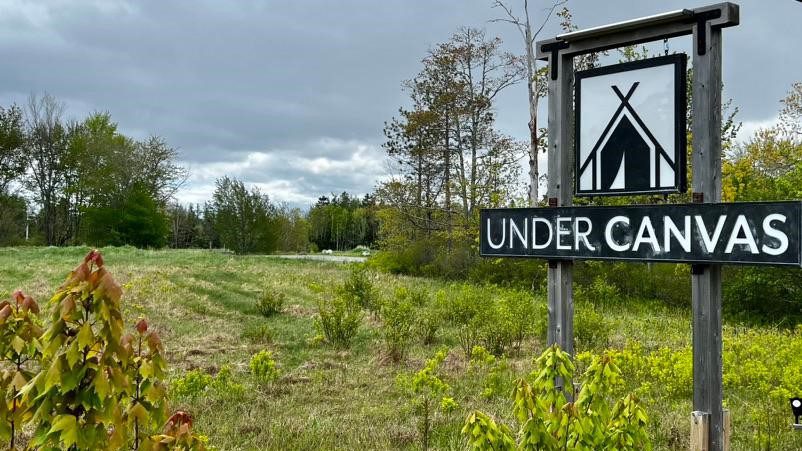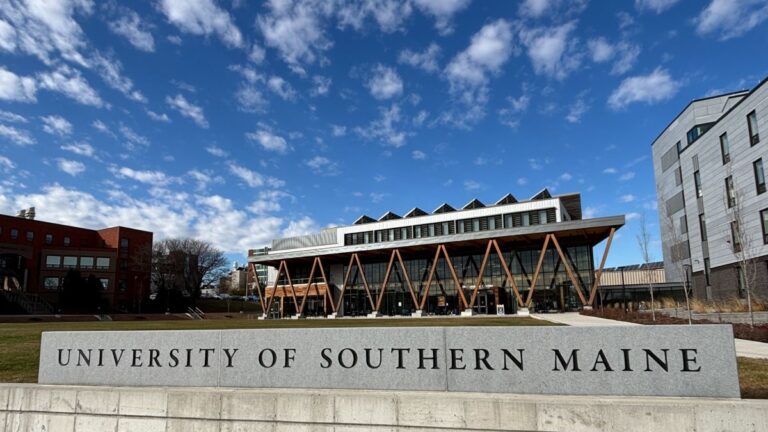Air conditioning. Private bathrooms with hot showers and flush toilets. A woodstove. A bedroom “wing.” A $600 per night price tag. Could this be… camping?
Not quite. A far cry from the soggy-bottomed tents of my youthful adventures, the new camping is far more glamorous (hence, glamping) with resorts springing up all over the state in recent years.
There’s been a particular focus (no surprise) on the towns surrounding Acadia National Park, including in nearby Surry, now home to Under Canvas, and Acadia Wilderness Lodge, in Tremont, Terramor Outdoor Resort in Bar Harbor and a handful of smaller, family-run operations.
“East Coast camp locations have been a long time coming,” Under Canvas CEO Sarah Dusek told the Bangor Daily News in 2019, adding that Acadia National Park had been its “most requested national park location to date.”
A new proposal, set for a public hearing on June 5 in the town of Lamoine, would offer 90 domed units, along with a restaurant, spa, employee housing and “activity domes” from which guests can bird watch and star gaze, nestled among the trees on 230 acres (12 acres would be developed, leaving most of the rest as open space) on Partridge Cove.
The guest domes would be the size of a comfortable New York City apartment, with between 425 and 845 square feet of floor space, and come complete with electricity, air conditioning, fireplaces and private bathrooms.
“Clear Sky Acadia,” would be the second project developed by Clear Sky Resorts, an Arizona-based company that owns a 45-dome glampground near the Grand Canyon.
Glampgrounds have generated considerable controversy in the area in recent years, with residents expressing concern about fire safety, wastewater treatment, noise and traffic. They also have created complications for local officials, since fall into a new regulatory category — not quite a campground, not quite a hotel — for which many communities have yet to develop ordinances, with some even wondering how to assess the canvas tents for tax purposes.
In Tremont, voters adopted the most stringent campground restrictions in Hancock County, with rules around setbacks, density, and a new definition for “recreational lodging facilities,” after a proposal for a 154 site campground generated considerable controversy, including a court case, a moratorium on campground development and the formation of a citizen’s group opposed to the plans.
Millions of annual visitors to Acadia National Park is nothing new. Most of that activity was, until recently, largely concentrated in and around Bar Harbor, which has long served as the hub for visitors from around the world. But that is changing, with tourists increasingly looking outside the seaside town to the “quiet side” of Mount Desert Island and communities across the bridge.
Property owners and developers have begun catering to those who want to explore communities around the park, with short term rentals springing up in communities across the county. Ellsworth, a half hour drive from Bar Harbor, has been named one of the top ten places to invest in an Airbnb or VRBO unit for several years running. Bar Harbor’s recently-enacted short-term rental regulations, which capped the number of allowed units in the town, have also helped push investors into nearby towns without regulations.
Proponents of glamping see it as a way to expand camping beyond the traditional market, including to those who may have mobility issues but want the experience of sleeping outside under the stars.
The National Park Service has been fielding increased calls for accessible campsites, which have stable, level surfaces without roots or rocks and specially-designed fire pits, picnic tables and trash receptacles.
“We are America’s parks — we belong to the people,” Jeremy Buzzell, chief of the Park Service’s National Accessibility Branch, told Sierra, the magazine of the Sierra Club. “For us to have any segment of the population not able to access them, that undermines our passion and purpose.”
“We saw people looking for unique ways of experiencing the outdoors, and not everyone is interested in traditional camping,” the CEO of Kampgrounds of America, Inc., which owns the Terramor brand, told the New York Times last year. The company opened its flagship luxury camping resort in Bar Harbor in 2020, and has plans to expand around the country.
But the company recently pulled an application for a similar resort in the Catskills after concerns that the project “did not meet criteria across several key benchmarks to warrant moving forward,” according to local news reports. Residents had also formed a group, Citizens Against Terramor, to oppose the plans, citing concerns over water supply and wetland impacts.
Frank Donnelly, a Lamoine resident who’s lived in the town for 40 years, said a similar group of concerned residents was taking shape in Lamoine and planned to attend the June 5 meeting. “It’s too big,” said Donnelly. “This area is being overdone.”







